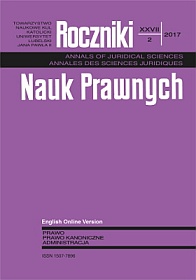Wymogi prowizji na urząd proboszcza w obowiązującym polskim ustawodawstwie synodalnym
Abstract
In the provision of the office of the pastor, norms of universal law and particular law must be observed. In canons 521 §§2–3, 522, 527 §§2–3, and 538 §1, the code legislator refers to regulations applicable in particular Churches.
The legislation of Polish synods clarified requirements for administrative acts of the provision of the office of pastor. They pertain to ecclesiastical authority, candidates for the post of pastor, the entrusting of the office and the formalities associated with these acts. Provisions of universal law were replicated or paraphrased in the majority of the synodal regulations. However, innovative directives concerning diocesan bishops or requirements for candidates for the office of pastor are spelled out in some of them. Typically, these would be the completion of a special formation course and passing of an examination for pastors.
For a provision to be valid, the office must be vacant. The reasons for the loss of office also are defined in the law of synods. Also, reasons due to the age of pastors are regulated. Only some synods require a written form of the act entrusting the office of pastor.
References
Coccopalmerio, Francesco. De paroecia. Rome: Editrice Pontificia Universitá Gregoriana, 1991.
Coccopalmerio, Francesco. “Il concetto di parrocchia nel CIC 1983.” In Parafia w prawie kanonicznym i w prawie polskim, edited by S.L. Głódź, J. Krukowski, and M. Sitarz, 7–37. Lublin: Wydawnictwo Naukowe KUL, 2013.
DʼOstilio, Francesco. Prontuario del Codice di diritto canonico. Città del Vaticano: Libreria Editrice Vaticana, 1995.
Góralski, Wojciech. “Synody partykularne.” In Księga II. Lud Boży. Część I. Wierni chrześcijanie. Część II. Ustrój hierarchiczny Kościoła. Vol. 2/1 of Komentarz do Kodeksu Prawa Kanonicznego, edited by J. Krukowski, 305–14. Poznań: Pallottinum, 2005.
Périsset, Jean-Claude. La paroisse. Commentaire des Canons 515–572. Paris: Edition Tardy, 1989.
Sitarz, Mirosław. “Organy kolegialne w kościołach partykularnych.” In Kościół partykularny w Kodeksie Jana Pawła II, edited by J. Krukowski and M. Sitarz, 115–53. Lublin: Wydawnictwo KUL, 2004.
Sitarz, Mirosław. “Podstawowe zasady w sprawowaniu władzy ustawodawczej biskupa diecezjalnego.” In II Polski Synod Plenarny a synody diecezjalne, edited by J. Krukowski, M. Sitarz, and A. Pastwa, 93–117. Lublin: Wydawnictwo Naukowe KUL, 2015.
Sitarz, Mirosław. “Zarządzanie parafią w sytuacjach nadzwyczajnych.” In Parafia w prawie kanonicznym i w prawie polskim, edited by S.L. Głódź, J. Krukowski, and M. Sitarz, 133–54. Lublin: Wydawnictwo Naukowe KUL, 2013.
Sobański, Remigiusz. “Urzędy kościelne.” In Księga I. Normy ogólne, edited by J. Krukowski. Vol. 1 of Komentarz do Kodeksu Prawa Kanonicznego, 235–86. Poznań: Pallottinum, 2003.
Sweeny, Edward A. The Obligations and Rights of the Pastor of a Parish. According to the Code of Canon Law. New York: Fathers and Brothers of the Society of St. Paul, 2002.
Viana, Antonio. “El párroco, pastor proprio de la paroquia.” Ius Canonicum 29 (1989): 467–81.
Wnuk, Radosław. “Prowizja kanoniczna na urząd proboszcza.” Kościół i Prawo 5, no. 1 (2016): 95–117.
Copyright (c) 2017 Roczniki Nauk Prawnych

This work is licensed under a Creative Commons Attribution-NonCommercial-NoDerivatives 4.0 International License.


